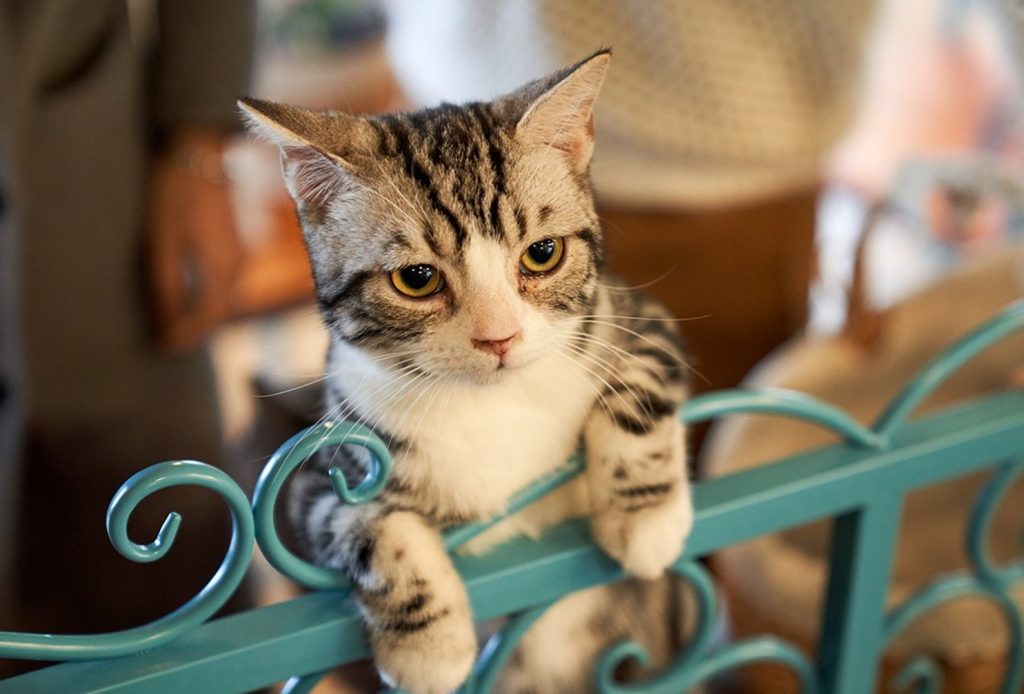Just like us humans, cats are sensitive creatures with layers of feelings and fears that they express via their behaviour when their world is not warm, calm and interesting. As a cat owner, learning to interpret your cat’s behaviour is an effective way of surfacing changes in the health and wellbeing of your pet at an early stage.
Are some cats more prone to anxiety than others?
Yes. Some cats are naturally anxious while others have become anxious due to an underlying causing such as early separation from their mother, being attacked by another animal, loud noises and even malnutrition.
What are the tell-tale signs of cat anxiety?
If your cat is exhibiting any of the following behaviours, it may be a sign that they are suffering from anxiety.
- They hide away. When a cat is on edge they will probably withdraw away from others to keep up their security while they manage the emotions that are disturbing them.
- Fear aggression. While there is a myriad of reasons your previously friendly kitty will show aggression fear is a major cause. Cats will bite, scratch, growl and hiss in an attempt to dominate and intimidate. Many cats who are genuinely fearful will come out appearing confident- using their attack as a defence.
- Vocalising – from yowling to growling, cats can use verbal noises to communicate their feelings. An anxious cat may use a series of staccato chirps to voice himself to the outside world. These can occasionally sound similar to the queen calling her kittens. Likewise, an angry cat may hiss to communicate their displeasure at the current situation and suggest that you back off.
- Restlessness. Heightened activity can indicate that your cat does not feel safe enough to rest.
- Toilet Training goes array. A cat urinating in an inappropriate place may have a medical problem or urinary infection however some cats will spray as a sign of anxiety and fear.
- Shivering. Cats don’t like to be surprised. If they anticipate negative events such as being pounced upon, chased or engaged in a fight they may express shivering as a way of dispelling any negative energy. When they can’t get away or run away, cats may shiver with fear or anxiety.
- Food consumption. A change in your pet’s appetite can indicate that they are stressed. Cats love routine when it comes to eating.
- Prolonged sleeping. Cats do love to sleep. Many can sleep up to 20 hours per day. However, a cat that does little other activity may be scared to venture out.
- Excessive grooming habits. Cats always clean themselves. However, if you notice your cat repeatedly licking herself, then this can be attributed to anxiety and stress. This is especially true if you observed that your cat has been losing her hair from over-grooming.
If your precious pet is experiencing any of these symptoms, then here are my Top 10 Tips for getting your cat back into a happy space.
- Change their diet. Cats are carnivores. Try something new and exciting for a cat. Real meat is a winner; particularly possum and rabbit meat. This stimulates the natural hunting instinct in the cat and releases positive neurotransmitters giving your cat a naturally occurring satisfied feeling.
- Give them a cat tree. Viewing the world from a safe, high vantage point feels ideal for a cat. Somewhere with a great view and lots of sun is the purrfect combo.
- Book your kitty in with a holistic cat vet. Your vet will look for health and behavioural causes. I see many anxious cat who actually have urinary infections and are trying to tell their owner that it hurts. No wonder they get grumpy or sad and depressed.
- Reduce stress. Environmental stressors include crowded conditions, climate, resource availability, and competition from other cats.
- Mimic the hunt. Placing meaty treats in novel locations on a cat dish can provide interest and fun for your cat. You can also develop a positive behavioural set around feeding time. Make your cat work for their tasty dish.
- Upgrade the litter box. Try a fresh new box with recycled paper litter. Situate them throughout the home in a variety of locations instead of clustered in one area. The one-plus-one rule (one box per cat plus one) reduces anxiety because cats don’t have to share. Change the box frequently.
- Seek a natural remedy for anxiety relief – herbal remedies like Herbal Cat Happiness catnip have proven benefits for cats. Catnip can induce play type behaviour and relaxation reducing stress hormones for your cat.
- Create a playground – Build a cat conservatory with fun toys.
- Make a cosy bed. Most cats love creature comforts. A real sheepskin or woollen blanket provides the cuddle factor that most cats appreciate. Fake plastic or polypropylene beds are not the same choose natural fibres.
Fortunately, moving your cat out of a high-anxiety zone does not need to be a big deal. Many holistic vets believe that anxiety is largely the result of incorrect diet and environmental factors. Correct these things, spend some time playing with your pet and they will naturally feel much happier.
Dr Heidi
Cat vet for VCN
P.S. For more tips on improving your cat’s diet and environment, check out my blog post 10 simple wellness tips that will have your cat purring.
Check out Olive’s Kitchen’s solutions for happier, healthier cats:
- Upgrade the goodness in your cat’s diet with Moggy Daily. Order online today.
- Try catnip, the all-natural stimulant that will get your cat purring. Order herbal cat happiness today.

